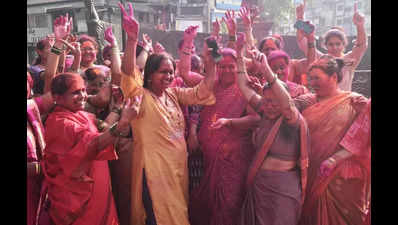
Pune: For an election fought primarily on women empowerment issues, largely the Ladki Bahin Scheme , only 8.8% women candidates were in the fray, and even fewer have won. Just 22 women will be a part of the new assembly, down from 24 in 2019.
Of the 55 women fielded by the two major blocs in the state, 21 Mahayuti candidates and one MVA nominee won. In Pune, Parvati saw a tough fight between two women — BJP's Madhuri Misal and NCP (SP)'s Ashwini Kadam. Misal secured the seat with 1,18,193 votes, winning with a margin of 54,660.
This is her fourth consecutive won and she is the seniormost MLA in the city. NCP debutant Sana Mallik also clinched a win in Mumbai's Anushakti Nagar, stepping into the political arena by taking over her father Nawab Malik's seat. Other winners included NCP's Aditi Tatkare, who won in Shrivardhan with 1,16,050 votes, Saroj Ahire in Deolali, BJP's Sneha Dubey Pandit in Vasai and Devayani Harande in Nashik Central, and Shiv Sena's Manjula Gavit in Sakri.
Maharashtra Jharkhand Maharashtra Alliance View i Party View Seats: 288 Results Majority: 145 BJP+ 229 MVA 47 OTH 12 Results : 288 / 288 BJP+ WON Jharkhand Alliance View i Party View Seats: 81 Results Majority: 41 INDIA 56 NDA 24 OTH 1 Results : 81 / 81 INDIA WON Source: PValue Only one woman from the opposition alliance won — Congress's Dr Jyothi Gaikwad in Dharavi constituency. Of the 4,136 candidates in this year's election, 363 were women — less than 10% of the total nominees — but slightly higher than the 235 women fielded in 2019. With 39 candidates, Mumbai topped the chart, followed by Thane (33), Pune (21), Nashik (20) and Nagpur (16).
As many as 97 constituencies had no woman candidate. These low figures were despite the two major alliances' discourse on women empowerment, the launch of schemes such as Ladki Bahin and the Parliament passing a law last year to reserve one-third of Lok Sabha and assembly seats for women — a law that is yet to be implemented. Analysts point out that the numbers also don't reflect the rise in women voters.
According to EC data, the gap between male and female voters has reduced over the years. In the 2024 assembly polls, 65.2% women cast their votes compared to 66.
8% men, a gap of 1.63 percentage points. In 2019, 59.
2% women voters had exercised their franchise compared to 62.8% male voters, a gap of 3.57 percentage points.
Prakash Pawar, former head of political department at Shivaji University, Kolhapur, said the Mahayuti created an imaginative and emotional narrative before the election to garner votes. "The Mahayuti made many promises before elections, including the Ladki Bahin scheme and 50% off for women on MSRTC buses. These worked, as we can see by the increase in voter turnout," Pawar said.
"However, this seems more to the detriment of women than their benefit. For example, prices of everything have increased and the amount given to them under Ladki Bahin scheme is barely enough to make ends meet, and not enough to make them financially independent. Bus fares may have reduced by half, but the buses continue to be in a deplorable condition," he added.
.














